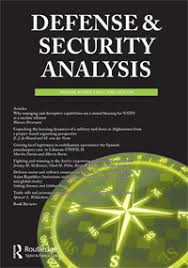
I am happy to announce that my article “German ‘Pacifism’ and the Zeitenwende” has been accepted for publication in Defense & Security Analysis.
The article examines German security policy after the Russian invasion of Ukraine. Following the invasion, German Chancellor Olaf Scholz announced a major reorientation of German security policy, committing the federal government to a significant increase in defence spending as well as arms deliveries to Ukraine. Scholz’s announcement of a Zeitenwende (sea change) has triggered a renewed debate about continuity and change in German security policy, with some observers claiming that the Zeitenwende marks the end of German “pacifism,” the country’s traditional culture of military reticence. In this article, I challenge this framing of the issue. I make three arguments: First, the aritcle places the recent policy shift under Chancellor Scholz in the context of German security policy during the Cold War to add some additional perspective on the degree of radicality of the shift, ultimately arguing that although there are significant shifts in public attitudes, claims of a departure from Germany’s civilian power role might be overblown. Second, the article discusses the changing German policy on out-of-area operations to show that with respect to anti-militarism, the culture of restraint or Germany’s civilian power role, the most relevant shift happened not following the Zeitenwende, but in the 1990s and 2000s. Third, based on a discussion of out-of-area operations as well as the Zeitenwende, the article makes the case for a discursive approach that is more suited to capturing the fluidity, convertibility and context-dependence of the ideational, or cultural factors that conventional constructivist approaches usually consider to be constant.
A pre-print is available here.